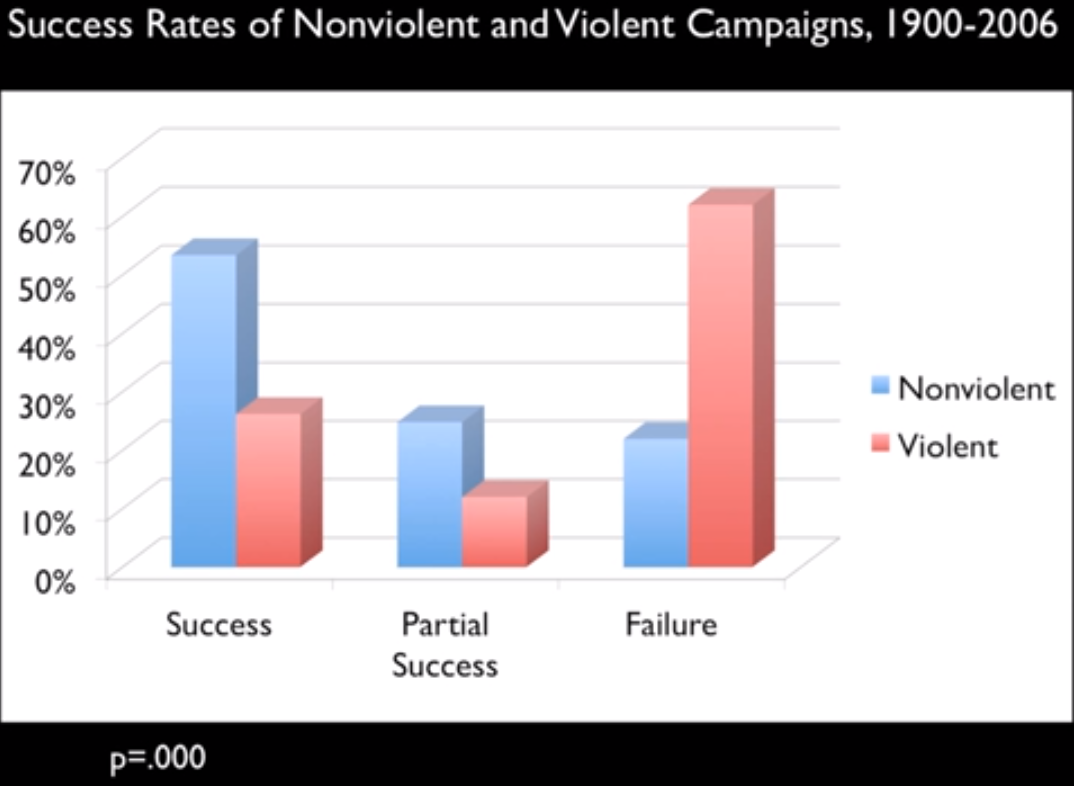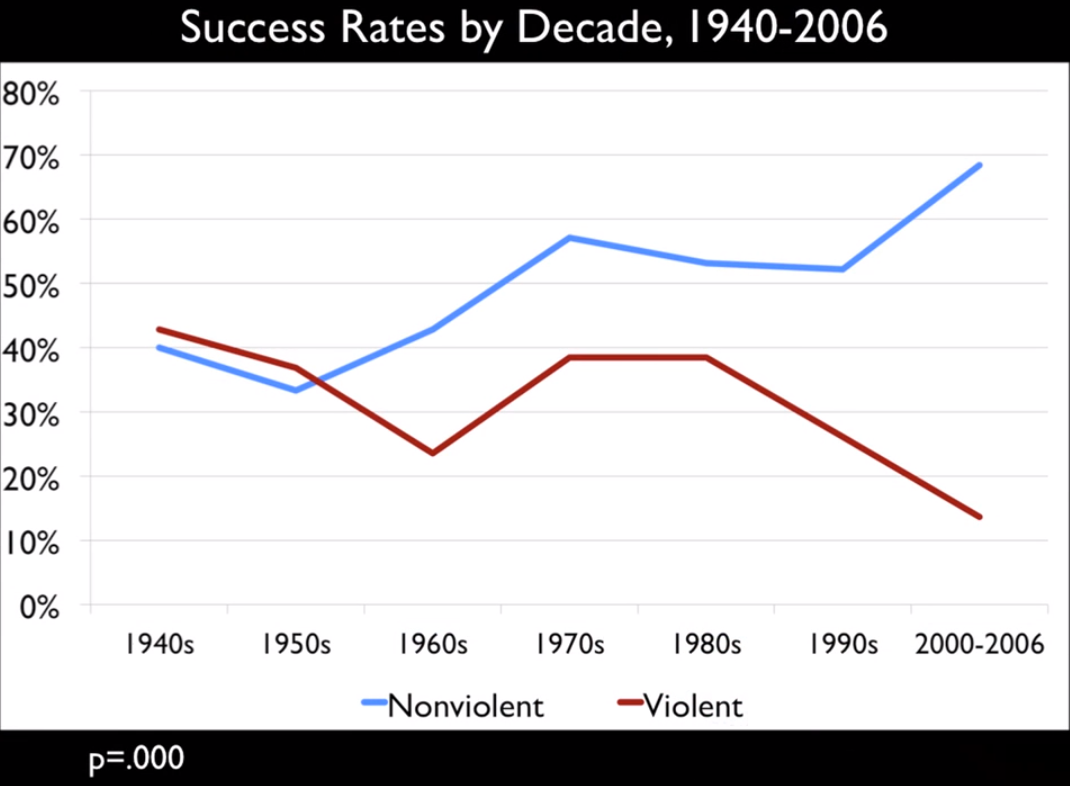Last week Ty presented a study of the teachings of the New Church to make a case for anti-war pacifism. This week Ty offers further arguments for a world that doesn't have to go to war based on the history of violent and non-violent conflict. -Editor
In the previous post, I tried to make a case for a form of pacifism based upon a close reading of the Heavenly Doctrines. In this piece, I want to add a real-world dimension to the more theologically-centered piece I wrote before. In that piece, I argued that the Doctrines don’t give a clear-cut view on just war. At best, war is an evil that is allowed, as a means of defense. And while there are mixed messages in the Word, most Christians support, at least in theory, some form of the Just War doctrine. If war is permitted, Just War doctrine requires a weighing of costs and benefits. The operative question in this section is, what if war never has to be the last resort? If there is always a less violent form of conflict at one’s disposal, then according to Just War doctrine, war is never just because it, in truth, is never the last resort.
Just War doctrine was created to deal with the tension between the ugliness of war and the necessity of defending one’s nation against threats, foreign or domestic. Because many (starting with Augustine) in the early Christian tradition found war at times necessary, they developed a set of conditions that needed to be met before war could be waged. Firstly, the just war tradition is predicated on defensive war. That is first and foremost. But it doesn’t stop there. Such considerations also need to be applied: 1) is the conflict winnable? 2) Does fighting a war produce evils greater than those that are trying to be eliminated? 3) Have all other means been exhausted? These are supposed to be held with utmost strictness because of the grave evils that take place in war. These conditions are generally accepted by non-secularists and secularists alike.
However, are these conditions compatible with the Heavenly Doctrines? If one is hesitant to believe in the pacifist imperative, surely he/she must at least be a strict adherent to the Just War doctrine. As explained in the previous post, there are plenty of passages in the Writings to lead one to conclude that a just war can be fought in only the narrowest of circumstances. But what if war never was the last resort? That is surely a big leap for many to take. As humans, we seem to collectively acknowledge the necessity of war. It is a phenomenon in which humans have invested extraordinary effort, material, and blood. Psychologically, it is difficult to let such an established institution go. In fact, one may argue that the perceived necessity of war drives the morality behind it; surely this would be putting the cart before the horse in a proper religious consideration of morality. The genesis of the Just War doctrine proceeded along these lines. As the seeming necessity of war became more pressing to Christians, pacifism became less popular.
Perception, though, is not reality. And in taking a more utilitarian view of war, perhaps the calculus used to derive costs and benefits rests on a false assumption: war is inevitable. Conflict surely is, but solving these conflicts through violent force is not. A study conducted by Maria J. Stephan and Erica Chenoweth in 2008 revealed that in all global conflicts between 1900-2006, violent methods had a 26% chance of being successful, while nonviolent methods had a 53% chance of being successful.

(Erica Chenoweth/YouTube)
That means, in the given data set of hundreds of conflicts throughout the past century nonviolence was more than twice as effective as violence. That’s a striking number, and made more so when the context is considered: there is comparatively little education and resources dedicated to nonviolent tactics. Much, much more time and energy have been put towards waging war. As nonviolence gains more attention, surely its success rate will improve. As it is, over the past several decades its success rate has increased drastically (as the violence success rate has decreased).

(Erica Chenoweth/YouTube)
One may argue, of course, that this data doesn’t prove that war is unnecessary, as it doesn’t rule out some unique circumstance where war truly is the last resort. It only points out that in most cases violence isn’t the best answer. This is a fair claim, and it may be possible to invent some hypothetical scenario or dredge up one from the past (I know what you’re thinking: World War II) that proves the necessity of war in some unique circumstance. However, I would argue in any case where there is potential for violent conflict to be successful, there is potential for nonviolent conflict to also be successful. They are, more or less, contingent on many of the same things: creative tactics, effective leadership, popular support, courage, and persistence. And because both are inherently political, they usually seek the same ends: at a very general level, to show the enemy that it isn’t worth fighting. With such parameters, nonviolence has some significant advantages. Among other things: there is no need for advanced military equipment, there is much greater likelihood of direct female participation, and by not killing your enemy, you starve them of a great wellspring of motivation to fight you (as killing so frequently causes the enemy to dig their heels in). It is also important to note that in basically every conceivable type of conflict throughout history, nonviolence has proven to be successful, and as the old axiom goes, “if it is, it’s possible.”
Morality is always co-opted by practicality to some degree. In the case of war, most people hold out the necessity of war because at times they feel engaging in war is the lesser of two evils. Of course many strict pacifists might say that there is a difference between allowing evil to be done, and engaging directly in evil actions (even if it is to prevent some greater evil). And despite our collective perceptions, the pacifist ideal is hardly impractical. Consider for a moment a world where war is never a necessity. In this case and clearly seen, war would never be given justification. Yet, it is our perceived belief that war is necessary such that people, particularly in the Christian tradition, strain so hard to find arguments in its favor.
Bibliography
Chenoweth, Erica. "The Success of Nonviolent Civil Resistance: Erica Chenoweth at TEDxBoulder." YouTube. Tedx, n.d. Web. 15 July 2014.
Stephan, Maria J., and Erica Chenoweth. "Why Civil Resistance Works: The Strategic Logic of Nonviolent Conflict." International Security 33.1 (2008): 7-44. Belfer Center. Harvard College and MIT, 2008. Web. 15 July 2014.
Ty Klippenstein
Ty received his B.A. in History and Philosophy at Gettysburg College and M.A. in Humanities at Arcadia University. He currently teaches Ancient and U.S. History at the Academy of the New Church. Reading and writing about Pacifism and Nonviolence is an ongoing hobby.